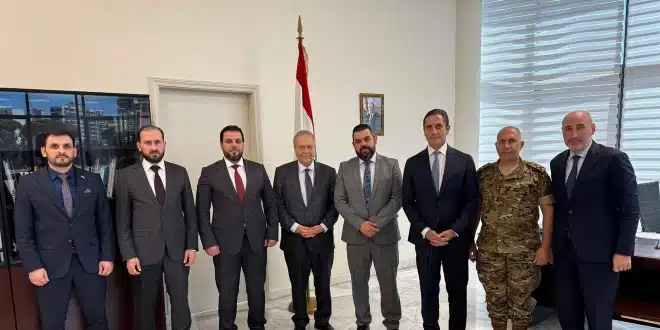Lebanon and Syria have agreed to establish two joint committees to tackle a series of longstanding and sensitive issues, including the status of nearly 2,000 Syrian nationals detained in Lebanese prisons, the fate of Lebanese citizens missing in Syria for decades, and the demarcation of their shared but often unmarked border.
The decision was announced on Monday during a landmark visit by a high-ranking Syrian delegation to Beirut. The group included two former Cabinet ministers and the head of Syria’s National Commission for Missing Persons, marking the first official visit since insurgent forces toppled President Bashar al-Assad’s government in early December.
A “New Page” in Relations
Syrian officials, now working under interim President Ahmad al-Sharaa, expressed their intention to “open a new page” with Lebanon. According to Lebanese judicial and security sources, the discussions may pave the way for an eventual visit to Beirut by Syria’s ministers of foreign affairs and justice, though no date has been finalized.
If confirmed, such a visit would represent a potential breakthrough in relations between the two countries, whose ties have been fraught for decades. Tensions run deep: the current Syrian leadership has a bitter stance toward Hezbollah, Lebanon’s Iran-backed movement that fought on Assad’s side during the civil war, while many Lebanese still harbor resentment over Syria’s 29-year military presence, which only ended in 2005.
Key Issues on the Table
Talks with Lebanese Deputy Prime Minister Tarek Mitri focused on three main issues: Syrian prisoners in Lebanon, missing Lebanese in Syria, and the porous border where smuggling remains rampant.
Officials revealed that roughly 800 of the Syrians detained in Lebanon face security-related accusations, ranging from shootings to attacks, while many others remain imprisoned without trial. In parallel, Lebanon pressed for progress on identifying its own nationals who disappeared in Syria over the years, an issue that has long strained ties.
The discussions also touched on the estimated 1.5 million Syrian refugees currently in Lebanon, most of whom fled the uprising and war in their homeland more than 14 years ago. This refugee population has placed significant economic and social pressure on Lebanon, which is grappling with its own financial crisis.
Another point of contention was the bilateral agreements signed under the Assad family’s 54-year rule. Syrian representatives sought to revisit these frameworks, while Lebanon suggested drafting new agreements tailored to current realities and challenges.
A Complex History of Tensions
Since Assad’s fall, two Lebanese prime ministers have made official visits to Syria. More recently, Lebanon’s President Joseph Aoun held direct talks with interim leader al-Sharaa during an Arab summit in Egypt this past March, signaling tentative efforts to rebuild trust.
The two nations only formalized diplomatic recognition in 2008, when embassies were opened in both capitals—65 years after Lebanon gained independence from France. While that step was hailed as historic at the time, relations have repeatedly been tested by conflict, refugee flows, and political divisions.
What Comes Next
Monday’s talks suggest both countries are seeking a fresh framework to resolve longstanding disputes. For Lebanon, progress on missing citizens and managing the refugee crisis will be a priority. For Syria, normalizing relations with its neighbor could help stabilize its regional standing after years of isolation.
Whether the committees can deliver tangible results remains to be seen, but the announcement points to a rare moment of cooperation between two states whose histories have been defined as much by conflict as by shared geography.


